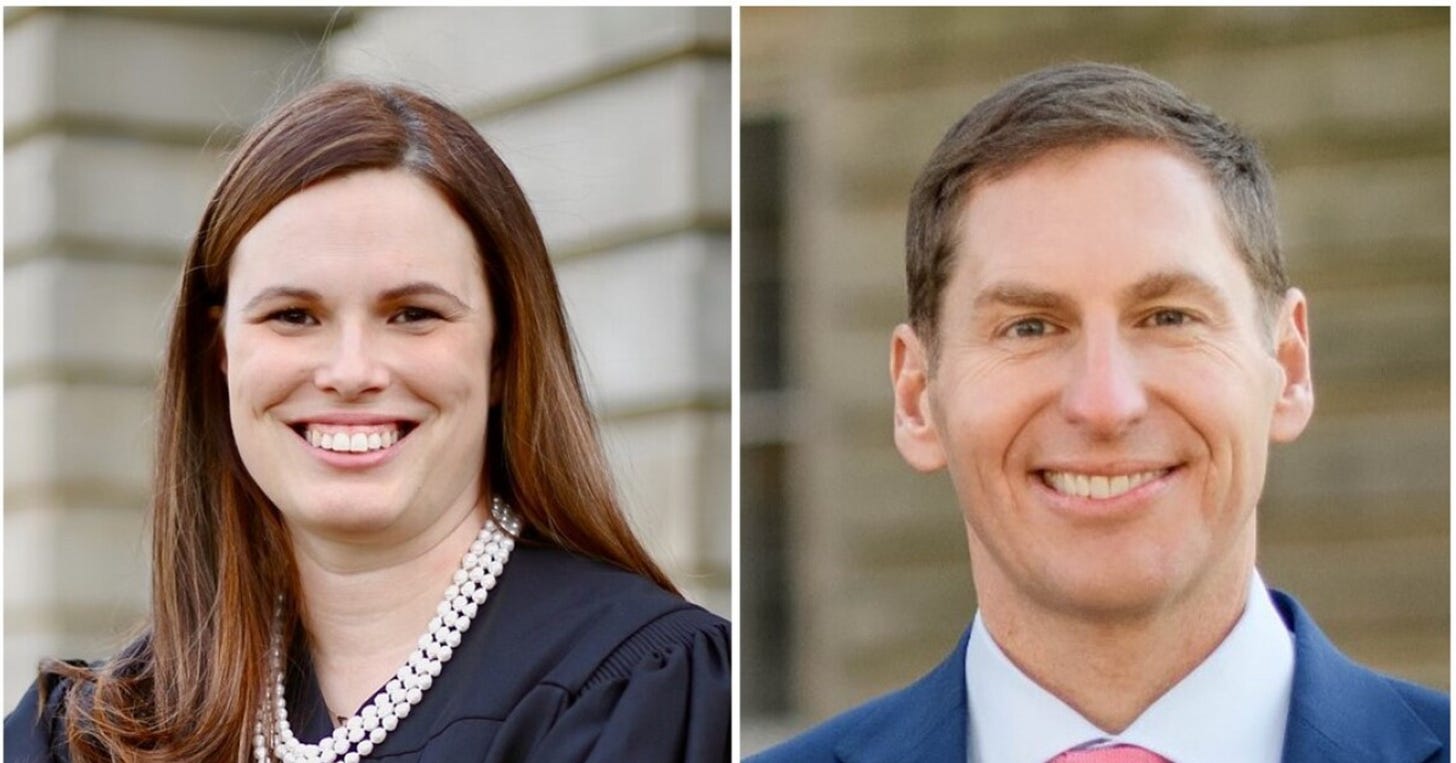"This is the 2020 Playbook on Steroids."
A man working for the DOJ is texting voting officials asking to look at their machines.
When Colorado Secretary of State Jena Griswold learned that someone from the Department of Justice was contacting local election officials in her state, alarm bells went off.
Around Colorado, county clerks said they were receiving messages from a man claiming to work for the DOJ named Jeff Small. Small, formerly Rep. Lauren Boebert’s chief of staff, began calling or texting Republican officials in Democratic districts, wondering if those clerks would allow White House appointees to come in and examine their voting machines.
But under Colorado law, access is restricted to authorized election officials and staff –– and one former election official in the state, Tina Peters, had gone to jail for it.
“Anybody who is asking for access to the voting machines outside of the law… that automatically raises red flags in terms of their intent,” said Matt Crane, director of the Colorado County Clerks Association. According to Crane, at least two county clerks said they were contacted by someone claiming to be from the Department of Homeland Security.
This didn’t sit well with many of the local election officials. Carly Koppes, the Republican clerk in Weld County, refused, saying: “Nobody gets access to my voting equipment, for security reasons.”
Justin Grantham, the Republican clerk in Fremont County, also said no. “It felt like they were wanting to intervene before 2026. As someone who’s in charge of elections,” he added, “we try to stay neutral, and it makes me feel a little bit uncomfortable that that’s how they’re wanting to try to gain access to these machines.”
Separately, at least nine states — Colorado, Florida, Wisconsin, Alaska, Minnesota, New Hampshire, New York, Nevada, and Oklahoma — have received requests from the DOJ asking for other information about their state’s voter rolls. A DOJ letter to Jena Griswold asked for information about a complaint alleging a violation in voter registration requirements. A similar letter to Arizona Secretary of State Adrian Fontes alleged “noncompliance” with voter verification requirements.
The DOJ is seeking expansive access to information that is constitutionally controlled by the states –– names, addresses, demographic information, registration status, party affiliation, and voting history. But it goes further. The DOJ also wants these states to turn over their methodology for verifying voter eligibility, their maintenance procedures, and how they ascertain which voters should be purged from the rolls.
For Griswold, history is reverberating loudly: “This is the 2020 playbook on steroids,” she said. “Do I think they are trying to undermine our elections at large in this country? Absolutely.”
One purge-the-rolls strategy was on display in the 2024 North Carolina Supreme Court election, when Republican Jefferson Griffin tried to contest the validity of more than 60,000 votes after the election took place. According to ProPublica, which obtained phone recordings related to Griffin’s legal challenge, the strategy of discarding ballots after they had been legally cast had been in the works since July 2024.
On a call with the Election Integrity Network, someone argued that a person who loses a close election could try to retroactively throw out ballots, calling them invalid, and try to change the outcome of the election.
Someone else on the call said, “That is straight up voter suppression, that will never fly in court.”
Another person responded, “I guess we’re going to find that out.”
The two potential state supreme court candidates did find out: no one was allowed to disqualify ballots after the fact. But with a master list of voter information from all across the country, the DOJ and cooperating states might not have to wait until after Election Day to keep voters from participating this time. Armed with information from the federal government, states could remove names ahead of the 2026 midterms. Or the DOJ could try to force them to do so, by withholding federal funds from the states or suing them.
But this is about more than some voting machines in Colorado and a handful of other states. Other actions related to elections are also raising significant constitutional questions. Back in March, President Trump signed “Securing America’s Elections,” an executive order that created sweeping (and, according to legal experts, unconstitutional) new federal authority over America’s election system. (I wrote about it in detail here.)
Included in these new regulations is a requirement that people prove their citizenship before registering to vote, something that is very difficult to do if you don’t have a passport. REAL IDs are not enough — without a passport, only an enhanced driver’s license will show your citizenship status. (And enhanced licenses are available in only five states.) According to the Campaign Legal Center, more than 20 million US citizens do not have documentary proof of citizenship.
The order requires government agencies like the Department of Homeland Security, DOGE, and the Social Security Administration to compare, including by subpoena, each state’s voter rolls against various databases in an effort to ensure that states are maintaining accurate records of who is eligible to vote. (In case you’re wondering if the Peter Thiel–founded Palantir will be building these databases, the answer is: probably.) The executive order also purports to give the federal government power to access election equipment, ballots, and all other materials used to conduct an election for federal office.
Almost as soon as the executive order was issued, lawsuits were filed arguing that the president had overstepped his authority. Under the Constitution’s Elections Clause, states have the power to run their own elections, subject to the authority of the US Congress.
Democratic attorneys general from 19 states filed a brief supporting the position of the plaintiffs. They called the order “unconstitutional, antidemocratic, and un-American.”
In a preliminary ruling in April, US District Judge Colleen Kollar-Kotelly blocked the parts of the executive order that were not based on prior congressional legislation. “Our Constitution entrusts Congress and the States — not the President — with the authority to regulate federal elections,” she wrote. “No statutory delegation of authority to the Executive Branch permits the President to short-circuit Congress’s deliberative process by executive order.”
The administration says it is protecting the integrity of the election process by enforcing these new rules, citing examples of other countries like Germany and India that have voting guidelines that differ from the United States. Trump’s executive order says, “Under the Constitution, State governments must safeguard American elections in compliance with Federal laws that protect Americans’ voting rights and guard against dilution by illegal voting, discrimination, fraud, and other forms of malfeasance and error.”
But for an illustration of where the president’s sympathies lie, look back to Colorado and former Mesa County Clerk Tina Peters.
Peters was convicted in 2024 after she allowed an unauthorized person into secure areas of her office to copy sensitive election system data. She was found guilty by a jury on seven counts, including four felonies, and sentenced to nine years in prison.
But now the DOJ is stepping into the fray by backing Tina Peters in her federal appeal, filing in court to attempt to free her from custody on bond while she challenges her state conviction. That intervention raised concerns among state election officials, who saw it as part of a broader campaign by the federal government to insert itself into state election oversight.
Then, in July, President Trump escalated those efforts. “Tina is an innocent Political Prisoner being horribly and unjustly punished in the form of Cruel and Unusual Punishment,” Trump said on social media. He claimed she was a “hostage” and ordered the DOJ to “take all necessary action” to secure her release.
Colorado, in its court filings, says that the DOJ is engaged in a “grotesque attempt to weaponize the rule of law.”
(Tina Peters was prosecuted by a Republican DA, and both the grand jury that recommended charging her and the jury that convicted her came from conservative parts of the state.)
“FREE TINA PETERS, NOW!” Trump wrote.
Colorado’s Attorney General Phil Weiser disagrees. He said, “We are firm in pursuing justice for the people of the state of Colorado, protecting free and fair elections, and standing up for the rule of law.”







Voting rights are the mother of all rights. This is the frontline where we fight fascism and authoritarians. The League of Women Voters is leading and you can join/support them. There is something for everyone to do. https://www.lwv.org/
I see an opportunity here. Instead of just playing defense and pointing out constitutional violations, maybe the winning message for Democrats is actually “we care about election integrity more than Republicans do, and here’s how we’re going to secure our elections properly.” Democrats have a setup to own the election integrity narrative instead of ceding it to Trump and his allies.
When you look at what’s happening inside the Republican party right now, there are existential fractures on the very question of legal integrity and the value of skepticism. Trump has been calling his own supporters “stupid” and disowning people who want accountability on issues related to the Epstein case, creating this weird dynamic where people who have leaned toward Trump only because of his anti-“Deep State” rhetoric are being told to shut up and trust authority by the guy who built his brand on distrust of institutions.
Democrats could position themselves as the party that actually listens to skeptics and takes their concerns seriously, even if they don’t ultimately cede any ground to unfounded concerns. Instead of dismissing people who have questions about election security, Democrats can say “we hear you, we understand why you might be skeptical, and here’s how we’re going to address those concerns through transparency and actual improvements rather than performative gestures.” This doesn’t mean accepting conspiracy theories, but it does mean engaging with the underlying anxieties in a way that gives skeptics less room to be skeptical.
Democrats should champion federal funding to make passports available to every American voter completely free of charge, with accessible outreach programs to help people get them. If Republicans want to require proof of citizenship to vote, fine, let’s make sure every single eligible American has easy access to that documentation, regardless of their finances or geography. Set up mobile passport services, partner with community organizations, make it as simple as possible for people to get the documents they need. Once that infrastructure exists, it becomes much harder for states to use documentation requirements as a barrier to voting.
Call their bluff on voter suppression laws. It might turn out that without the hurdles of access to documentation, that it’s Republicans who are inherently less open to proving to the government who they are at the ballot box. Republicans can’t argue against making it easier for citizens to prove their citizenship, and Democrats get to be the party that’s actually solving the practical barriers these laws create.
Democrats should also champion federal legislation that prohibits any laws restricting voting access until adequate resources have been provided to ensure no significant number of eligible voters will be disenfranchised. Focus the messaging on disenfranchised eligible voters who have been denied a vote and how those numbers are higher than any documented cases of non-eligible voters casting a ballot in past elections. An eligible voter denied a ballot is just as corrupting for the election as any non-eligible voter who is allowed to vote. But unlike non-eligible voters who do vote, the eligible voters who are denied ballots actually exist in significant numbers each election.
Republicans have spent years claiming they’re the party of election security while actually undermining confidence in our systems and trying to manipulate access after the fact. Democrats can counter by saying “fine, you want election integrity? Let’s actually do it right.” This means launching a comprehensive campaign that not only includes real education about how our elections are already incredibly secure, featuring testimonials and expert opinions from Republican election officials like those Colorado clerks who refused to give access to the machines, but also testimonials of voters who have been denied a voice by Republican voter suppression laws. When Republican election administrators are telling people the system works and Trump appointees are the ones trying to circumvent proper procedures, that’s powerful messaging that cuts across party lines.
We would end up with a system that’s both more secure and more accessible, which is exactly what actual election integrity should look like, not these backdoor attempts to manipulate voter rolls and access machines outside of legal channels.
Of course people like Tina Peters will move goalposts and will never be satisfied until only people who look like her are eligible to vote. I’m not saying we play to her values. I’m saying we target the vast number of Republicans who do have rational questions about whether it’s possible at all for someone to cast an invalid vote. Education and financial resources seem like the only way to neutralize what has become a significant political vulnerability for Democrats, unfairly or not. And the current message of “trust us, people who shouldn’t vote don’t vote” isn’t working.